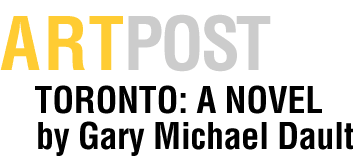Michael found it grotesque to imagine some
bridge of sensibility stretching from Raphael, Leonardo, Uccello, Piero della
Francesco and the other household gods of the quattrocento to the surly,
roughhewn Homer Rubik. Somebody,
thought Michael—a father, a mother, a custodian?—had once given their baby the
noble name of Homer, thus heading him, early and exuberantly, out onto the road
to great things, a road Michael felt it was unlikely Homer could have followed
for very long.
Still Bliss had assured him Homer
could draw and paint like an angel.
Even a fallen angel. He’d
like to see for himself.
So one day when he didn’t feel either like
the writing he was supposed to do or the painting he usually enjoyed doing,
Michael wandered into the Spadina Subway station around eleven on a frosty Tuesday
morning in search of Bliss.
He spotted Fish first. He was tied—too tightly, thought
Michael—to a pillar.
“Hello Fish,” he called out, with a
cheerfulness he didn’t feel, “where’s your mistress?”
Fish looked away and them cocked his leg
against the pillar and peed.
“Fish the Wonder Dog,” thought Michael.
“Well if it’s not the Big Writer!” he
heard a voice say, “Zorba the Greek!”
“Zorba wasn’t a writer,” Michael told her.
“But he was Greek, right? Close enough!”
Michael wanted to ask her straightaway about Homer Rubik,
but, given Bliss’s never-ending heartiness and stridency, he had little choice
but to ease into it.
“What are you doing this morning?” he
asked her.
“Getting my bearings,” she told him.
“How?”
“Coffee. Walking Fish.
Reading the paper.”
“Did you enjoy my friend Rubel Force’s
opening last week?
“Not much,” said Bliss. “Friggin
Paintings of friggin cellophane?
What the hell for?”
“How about your pal Homer? What did he think?”
“Homer hated the whole evening. But then Homer hates a lot of things.”
Michael thought about this briefly and
decided it was probably true. But
where did this angelic drawing skill of Rubik’s come from?
“I wouldn’t mind seeing some more of
Homer’s stuff,” Michael told her.
“Why?’ Bliss asked.
“Just curious,” he replied. “He seems to be a remarkable
artist.” Michael didn’t want
dilate, just at the moment, upon the ways in which Homer seemed remarkable .
“Well, he’s just going to work around now,” she said,
glancing at the subway station clock.
“We could go and get something
to eat where he’s the cook.”
The idea of eating anything at the diner
where Homer was the cook was an unappealing one, but Michael agreed they should
go there. He wanted to observe Mr.
Renaissance Master in his everyday habitat.
“You can buy me one of Homer’s all-day
breakfasts,” Bliss said cheerfully.
“And you can buy Fish a Crispy Crunch bar!”
Michael decided this wasn’t too high a
price to pay for a start of a tour around Homer Rubik.
“I still don’t get this interest of yours
in Homer,” Bliss told him, as they stepped into a westbound Bloor subway
train. Bliss managed to yank Fish
inside just as the doors were closing.
“I thought I might write something about
him,” Michael said.
“Oh geez, there’s a really bad idea!”
“Why? Most artists are desperate for
coverage.”
“Well not Homer. He’s a real private guy.”
“How private?”
“Look,” said Bliss, “just don’t write
anything about him, okay?”
“It’d be more about his work than about
him.”
“Doesn’t matter,” Bliss told him. “Don’t do it.”
Michael was thinking this over when he
noticed his left leg felt warm and wet.
He looked down. Fish was
pissing on him.




